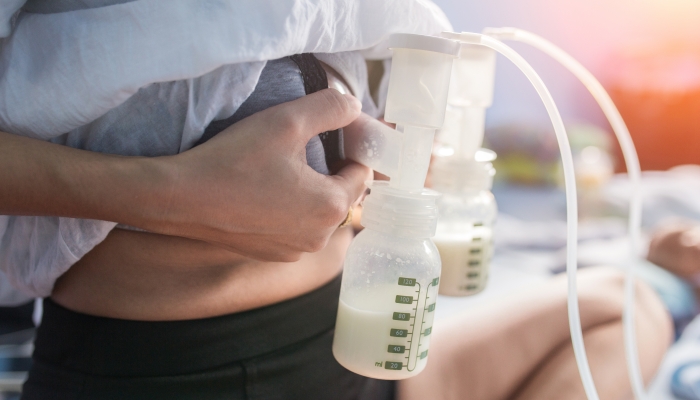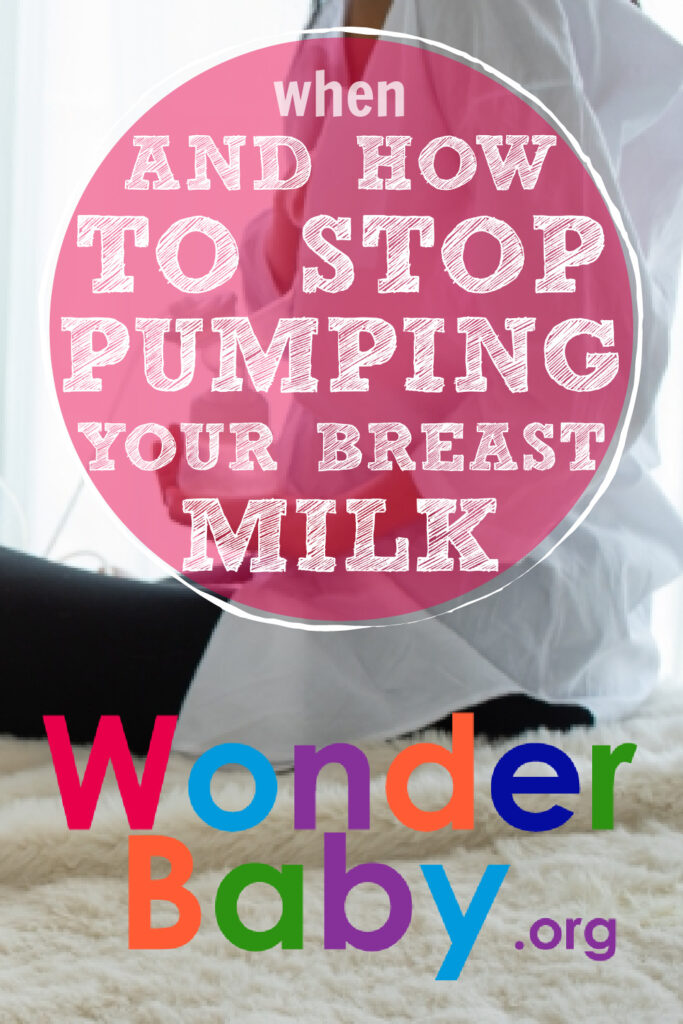When and How to Stop Pumping Your Breast Milk

- The right time to stop pumping is whenever you feel ready.
- Wean off of pumping as slowly as you can.
- Be aware of hormonal changes when you stop pumping.
- Use at home remedies like cabbage leaves and breast massage for mastitis.
Deciding when and how to stop pumping your breast milk is a very personal decision that every mother must make for themselves. It is completely normal to feel a mixture of grief and relief when you begin the weaning process.
Between power pumping, mastitis, cluster feeding, and milk stains, some mothers cannot wait to stop pumping. On the other hand, feeding your baby with your own breast milk can help you feel closer to your baby. Ending your breastfeeding journey may feel like the end of a special time between you and your baby.
Weaning from the pump slowly is the best strategy for avoiding pain, clogged ducts, and mastitis. You can drop pumping sessions one at a time over a few weeks for the easiest transition.
Getting Ready to Stop Pumping
If you have been exclusively pumping for a long time, the transition to a different type of feeding might be difficult for both you and your baby. Make sure you are ready to wean safely, give your body enough time to adjust, and help your baby adjust to whatever breast milk replacement you choose.
Common Reasons to Stop Pumping
Time
Ending maternity leave is a common reason that mothers start dropping pumping sessions or wean from the pump completely. Exclusively pumping is time consuming. Fitting pumping sessions in between work meetings is difficult. Carrying around a breast pump and storing milk is more than a minor inconvenience.
Infections
HIV, Hepatitis C, Thrush, or MRSA can be passed through the breast milk or from skin to skin contact with the baby. If you are diagnosed with any of these conditions, it is best to switch to formula.
Baby Starts Eating Solids
As babies get older, they start replacing milk with solid foods. Their need for milk gradually decreases. Your breast milk production will slow down when you don’t need as much to give your baby. As you demand less from your breasts, they decrease milk production.
Pumping Becomes too Stressful
Pumping and breastfeeding are time consuming. For mothers dealing with low supply, fussy babies, busy work schedules, and other life stressors, pumping can create too much additional burden. While breast milk has wonderful benefits, it is important to prioritize your mental health and well being so you can be the best mother to your baby.

The Best Time to Stop Pumping
The best time to stop pumping breast milk is when you feel you are ready. The American Academy of Pediatrics recommends feeding your baby breast milk only for 6 months, and including breast milk in your baby’s diet until they are two years old.
Choosing to continue pumping or breastfeeding for two years protects you from diabetes and cancer, and allows your baby to benefit from breast milk into toddlerhood. However, if pumping or breastfeeding is causing distress, it is time to stop pumping.
| US average | |
| Any Breast milk | 83% |
| Exclusively breast fed through 3 months | 45% |
| Breast Milk for 6 months | 36% |
| Breast Milk for 1 year | 56% |
Most women try to keep up with social norms, but there are no set rules about when to wean your baby from breast milk. Listen to your body when you feel it is time to quit pumping or breastfeeding. US moms may try to follow the American Academy of Pediatrics recommendations. Whatever you choose, you should do what works best for both you and your baby.
What Happens if You Suddenly Stop Pumping?
If you have made the decision to stop pumping, you might be tempted to quit cold turkey. Stopping cold turkey can lead to pain, leaking breasts, engorgement, clogged ducts, and mastitis. If you must suddenly stop pumping, call a lactation consultant to help you through the process.
4 Steps to Wean Off Pumping Safely
Quitting exclusive pumping cold turkey is possible, but not recommended. Giving your body time to adjust to a new schedule can prevent clogged ducts and mastitis, decrease pain from engorgement, and give your baby time to adjust to a new diet. Below are 5 steps to wean off pumping safely.
1. Drop one pumping session at a time.
The slower you can wean from pumping, the better. Try dropping just one pumping session every week or two. Most mom’s breasts are the most full in the morning, so dropping a midday or evening session first will be easier.
When you get down to only one session per day, you can shorten the session by just a few minutes each day until your last pumping session.
2. Express just enough to minimize discomfort.
If dropping a full pumping session causes too much discomfort, it’s okay to express a little milk. Preventing engorgement is the best way to avoid mastitis. As you express less and less, your milk supply will decrease. If you completely empty your breasts each time they feel full, your body will continue milk production to meet the demand.
3. Slowly transition your baby to a new type of milk.
Cows milk, rice milk, and soy milk should not be given to a baby under one year old. If weaning from pumping for an infant under 12 months, switch to a formula created for infants. Some babies will eat anything, and others might need to try a few types of formula before they accept one. This guide from the Mayo Clinic can help you choose the right formula for your baby.
4. Don’t forget to take care of your emotional health.
Weaning from the pump causes hormonal changes. Many moms feel down or even depressed after they stop pumping milk. Having a supportive partner or healthcare provider can help you through the weaning process. Remember that these changes are normal and you should feel better within a few weeks of weaning. Reach out to a healthcare provider or trusted friend if you start to feel sad, hopeless, or have feelings of self harm.
How Long Will It Take to Completely Wean Off Pumping?
The time it takes for milk supply to dry up is different for each mom. Some moms may wean from the pump in a few days, and some may need a few months. The important thing is to wean slowly enough to avoid engorgement or clogged milk ducts.

Preventing Engorgement & Mastitis While Pump Weaning
Mastitis is caused by a clogged duct that does not empty. The duct becomes swollen, inflamed, and painful. If you get mastitis you may experience flu-like symptoms. The best way to prevent this is to empty the breasts. When weaning from pumping, emptying the breasts is counterproductive. So what is a weaning mom to do?
- Wear a supportive bra.
- Slow down your weaning process.
- Apply cabbage leaves to your breasts.
- Use therapeutic breast massage to decrease engorgement.
FAQs
Will you gain weight if you stop pumping?
Your body uses a lot of calories to make breast milk. When you stop pumping, you no longer need those extra calories. If you do not adjust your calorie intake when you stop pumping, it is possible that you will gain weight.
Breastfeeding burns about 250-500 calories per day. When you stop pumping, you will either have to add exercise or consume less calories to avoid weight gain.
Is it possible to start pumping again after stopping?
It is possible to start making milk again after you have stopped. Relactation takes a lot of work and patience, but it can be done. It usually takes several weeks for your body to stop producing all breast milk.
What should I do with my breast pump after I stop pumping?
Because of the risk of infection through exchange of bodily fluids, it is not recommended to use a hand-me-down breast pump. Most charitable organizations will not accept breast pumps as donations. Some pump companies, like Medela, offer recycling programs for breast pumps.

The information WonderBaby provides is not intended to be, and does not constitute, medical or other health advice or diagnosis and should not be used as such. Always consult with a qualified medical professional about your specific circumstances.
Related Posts

Breastfeeding, Sleep
Sleep and Breastfeeding: A Comprehensive Guide for Nursing Moms
Many people assume breastfeeding and sleep training don’t go together, but it is possible to help your baby sleep better while continuing your breastfeeding journey.

Breastfeeding
Comfort Nursing: Pros, Cons, and How to Stop
Find out what comfort nursing is, when should you worry about it, and how to stop or limit your baby's comfort nursing (especially at night!).

Breastfeeding, Product Reviews
5 Best Breastfeeding Chairs for Nursing Moms of 2023
Whether you want a gentle rock, a smooth glide, or a cozy cuddle to soothe your baby to sleep, you’ll have your pick of the best breastfeeding chairs on the...